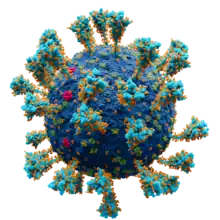FAKHRAVAC
FAKHRAVAC (Persian: واکسن فخرا) is a COVID-19 vaccine developed in Iran by the Organization of Defensive Innovation and Research,[1] a subsidiary of Iran's Ministry of Defense. It is the third Iranian COVID-19 vaccine reaching clinical trials.[1][2][3] It is currently in phase III.[4][5] It has received emergency use authorization in Iran on 9 September 2021.[4]
.jpg.webp) A vial of FakhraVac | |
| Vaccine description | |
|---|---|
| Target | SARS-CoV-2 |
| Vaccine type | Inactivated |
| Clinical data | |
| Other names | Fakhra, MIVAC |
| Routes of administration | Intramuscular |
| Legal status | |
| Legal status |
|
| Part of a series on the |
| COVID-19 pandemic |
|---|
 Scientifically accurate atomic model of the external structure of SARS-CoV-2. Each "ball" is an atom. |
|
|
Medical response |
|
|
|
The vaccine is named after the Iranian nuclear scientist Mohsen Fakhrizadeh.[1] According to the Iranian authorities, he was working on a vaccine in response to the COVID-19 pandemic in Iran.[1][6] Fakhrizadeh was assassinated in November 2020 in an attack Iran and US intelligence attributed to Israel.[1][7]
Medical uses
It requiring two doses given by intramuscular injection 3 weeks apart.[5]
Pharmacology
FAKHRAVAC is an inactivated virus-based vaccine.[3]
Manufacturing
In August 2021, production capacity of the vaccine is reported to be 1 million dose per month and is planned to be "multiplied in a few months ".[4] In October 2021, the production has reported to be stopped amid Iran's growing vaccine imports.[8] In January 2022, the Director General of Health of the Ministry of Defense announced that the first shipment (around 462,000 doses) of the vaccine had been delivered to the Iranian Ministry of Health.[9]
Clinical trials
| Phase | Registration number | Start | Number of participants | Age of participants | ||
|---|---|---|---|---|---|---|
| Total | Vaccine | Control | ||||
| I | IRCT20210206050259N1 | 8 March 2021 | 135 | 96? | 39? (placebo) | 18–55 years |
| II | IRCT20210206050259N2 | 8 June 2021 | 500 | 250 | 250 (placebo) | 18–70 years |
| III | IRCT20210206050259N3 | 29 August 2021 | 41,128 | 20,564 | 20,564 (Sinopharm BIBP vaccine) | >18 years |
Authorizations
FAKHRAVAC received emergency use authorization in Iran on 9 September 2021.[4] In October 2021, Iran's Food and Drug Administration was considering giving full authorization to the vaccine for third/booster dose.[8]
References
- Motamedi M (16 March 2021). "Iran starts human trials of its third domestic COVID vaccine". Al Jazeera.
- "Phase 1, safety, immunogenicity and dose finding for two strengths of 0.5 × 10^6 and 2.5 × 10^6 (TCID50) inactivated SARS-CoV-2 vaccine FAKHRAVAC (MIVAC) injected in two schedules of two doses, 2 and 3 weeks apart in healthy adults aged 18-55 years: a randomized, double blind, placebo controlled, clinical trial". en.irct.ir. Iran Registry of Clinical Trials. Retrieved 21 March 2021.
- "Phase 2 trial of safety and immunogenicity of 10 micro gram inactivated SARS-CoV-2 vaccine (FAKHRAVAC), two doses two weeks apart in adults aged 18-70 years: a randomized, double-blind, placebo-controlled, clinical trial". en.irct.ir. Iran Registry of Clinical Trials. Retrieved 15 June 2021.
- "Iran Authorizes Emergency Use of Third Homegrown Vaccine - Defense news". Tasnim News Agency. Retrieved 9 September 2021.
- "IRCT | Comparison of the safety, efficacy and immunogenicity of Fakhravac and Sinopharm SARS-CoV-2 vaccines, in adults aged 18 and over; a phase III randomised, non-inferiority clinical trial". en.irct.ir. Retrieved 7 September 2021.
- "Research center run by Fakhrizadeh produced first COVID-19 test kits for Iranians: Defense minister". Pars Today. 28 November 2020. Archived from the original on 5 December 2020. Retrieved 7 September 2021.
- The Assassination of Fakhrizadeh: Considerations and Consequences
- Sinaee, Maryam (19 October 2021). "Iran Defense Ministry's Covid Vaccine Production To Be Discontinued". Iran International. Retrieved 24 October 2021.
- "تحویل نخستین محموله واکسن فخرا به وزارت بهداشت". YJC News. 19 January 2022.
| Development | |||||||||||
|---|---|---|---|---|---|---|---|---|---|---|---|
| Classes | |||||||||||
| Administration | |||||||||||
| Vaccines |
| ||||||||||
| Inventors/ researchers | |||||||||||
| Controversy | |||||||||||
| Related | |||||||||||
| |||||||||||